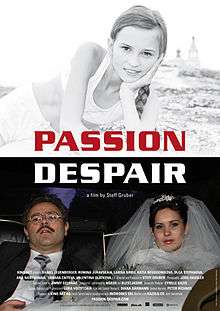Passion Despair
Passion Despair is a documentary film by Swiss filmmaker Steff Gruber. Gruber started shooting in 2005. The film premiered at the Gdansk Dokfilm Festival 2011.[1]
| Passion Despair | |
|---|---|
 | |
| Directed by | Steff Gruber |
| Produced by | Steff Gruber |
| Written by | Steff Gruber |
| Starring | Daniel Leuenberger Romina Juravskaia Olga Stepnova Katja Neugodnikova Ana Neugodnikova Ana Nasushnaia Larisa Sirbu Luba Voitetcaia Tamara Zaitseva u.a. |
| Music by | Jimmy Gelhaar |
| Cinematography | Jürg Hassler Steff Gruber |
| Edited by | Steff Gruber |
Release date |
|
Running time | 93 minutes |
| Language | German English Russian Romanian |
Overview
Steff Gruber's documentary film portrays the Swiss photographer Daniel Leuenberger, who lives in Moldova and specialises in photographing girls aged between 9 and 14.
Daniel has caused much controversy with the photos of his models which he sells via the Internet. Daniel's critics base their argument above all on the fact that the majority of his customers are pedophiles.
Daniel Leuenberger too finds himself marginalised and pushed to the edge. In the film he talks about how he deals with his feelings, about prejudice and about his work as a photographer of girls. The film raises questions of how images are used and their effects in a world increasingly dominated by the media.
In addition to Daniel's work as a portrait photographer, the film concentrates on the daily struggle for survival of Moldovan families and life in the officially non-existent neighbouring state of Transnistria. The small state, in which half a million people live, is hermetically sealed off from the outside world. Police and secret service are omnipresent; any opposition is nipped in the bud. The film shows how the mostly fatherless families in these two countries find ways to survive.
Festivals
References
- "9-th Edition | Gdansk DocFilm Festival". Gdansk DocFilm Festival. Archived from the original on 24 February 2015. Retrieved 24 February 2015.